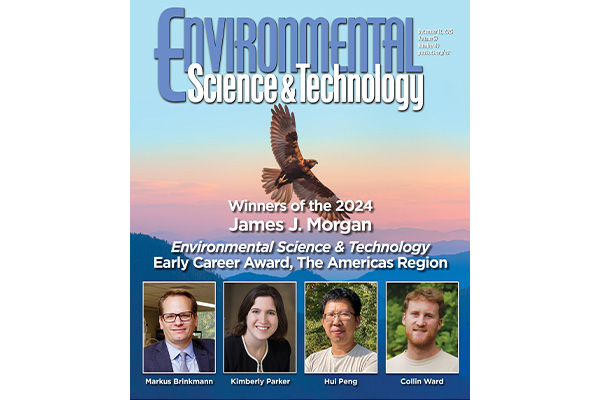Parker receives Morgan Early Career Award
Kimberly Parker won the 2024 James J. Morgan Early Career Award from the American Chemical Society

Kimberly Parker, assistant professor of energy, environmental & chemical engineering in the McKelvey School of Engineering at Washington University in St. Louis, won the 2024 James J. Morgan Early Career Award. The honor recognizes Parker’s research contributions to environmental chemistry of agrochemicals, environmental impact of novel synthetic biology products, and reaction mechanisms for water treatment and environmental health.
The Morgan Early Career Award is given each year by the Environmental Chemistry Division of the American Chemical Society (ACS), its flagship journal Environmental Science & Technology (ES&T) and ES&T Letters. The award was established in 2014 in honor of Morgan, the first editor-in-chief of ES&T, and recognizes researchers early in their careers who are making waves in environmental science and technology.
“We are excited to present the James J. Morgan to researchers who are innovating and advancing environmental science and technology in refreshing and meaningful ways,” the editors-in-chief of ES&T and ES&T Letters wrote in their award announcement. “The four award winners for 2024 clearly illustrate the power of imagination in engaging global challenges.”
Parker leads an environmental chemistry research group in McKelvey Engineering at WashU, where she and her team study the fate of chemical and biological pollutants in soil, air and water. She is a member of the inaugural Early Career Board at ES&T and serves as the associate director for the Center for Water Innovation at WashU.
“Kim is applying her expertise in chemical transformations of organic pollutants and biological molecules to a range of important scientific questions of major societal relevance,” said Dan Giammar, the Walter E. Browne Professor of Environmental Engineering in McKelvey Engineering. “For example, in her research on emerging agrochemicals, Kim has picked up the torch of Rachel Carson and other environmental scientists and engineers who have probed the fate and transport of agrochemicals in the environment. Kim has established herself as one of the leading researchers on the fate and transport of RNA interference biopesticides, and she has made important contributions to the understanding of dicamba volatilization, a process associated with drift from one field to another that has been the subject of significant public discourse in the Midwest region.”
Parker will deliver an invited presentation when receiving the award during the ACS National Meeting in New Orleans in March 2024.




